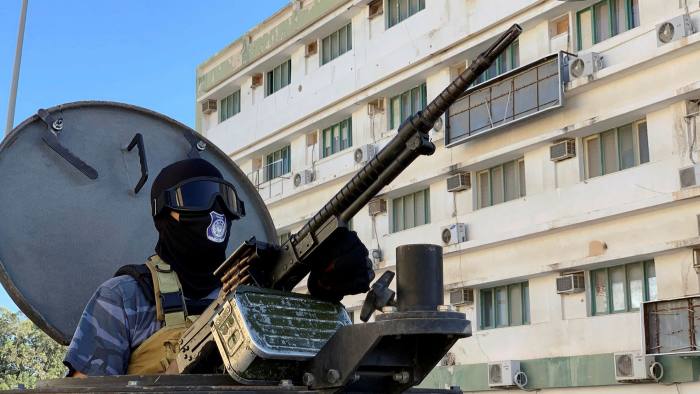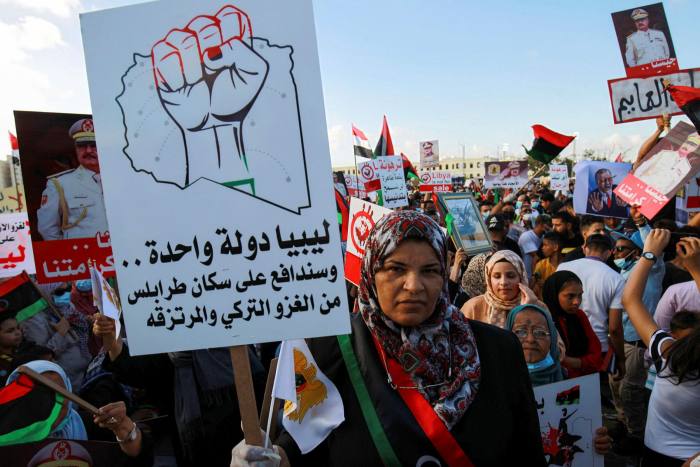Libya at a ‘turning point’, warns UN official
Foreign backers pour weapons into both sides of the conflict despite ceasefire

The UN has warned that war-torn Libya is at a “decisive turning point” with weapons from foreign backers pouring in to both sides of the conflict and coronavirus “spiralling out of control”.
Stephanie Williams, the acting representative of the UN secretary-general in Libya, told the UN Security Council on Wednesday evening that action by the international community would “help determine whether the country descends into new depths of fragmentation and chaos or progresses towards a more prosperous future”.
The conflict in the oil-producing country pitting Khalifa Haftar, an eastern-based general against the UN-recognised Government of National Accord in Tripoli in the west of the country, has become a proxy war drawing in regional and international powers.
Turkey has armed the GNA and brought in thousands of Syrian mercenaries. Russian mercenaries fight alongside Gen Haftar’s forces and he has received arms, logistical support and diplomatic cover variously from the United Arab Emirates, Egypt, Jordan and France.
“Foreign sponsors are fortifying their assets at key Libyan air bases in the east and west,” said Ms Williams. “The Mission continues to receive reports of large-scale presence of foreign mercenaries and operatives, further complicating local dynamics and chances of a future settlement.”

The UN warning comes despite a fragile calm that has prevailed since early June after forces loyal to Gen Haftar’s self-styled Libyan National Army were driven back from the outskirts of Tripoli, the capital, marking the failure of his 14-month offensive to capture the city.
Fayez al-Sarraj, the head of the GNA, announced a ceasefire on August 21. On the same day Aguila Saleh, the Speaker of an elected parliament in eastern Libya aligned with Gen Haftar, also called for a cessation of hostilities.
The military strongman has not commented on the ceasefire declarations, but his officials have dismissed them. Even so, the ceasefire announcement received broad international welcome and there are suggestions that after his losses, the intransigent general is being sidelined by some of his backers including Egypt and Russia.
Ms Williams told the security council about a “fragile window of opportunity” afforded by the current calm and said she “remained optimistic” the two ceasefire declarations provided a chance to move forward with “intra Libyan political and security discussions”.
“The ceasefire is not dead as an initiative,” said Jalel Harchaoui, Libya analyst at the Clingendael Institute, a Dutch think-tank. He argued the UN was seeking to muster international support for a political process that could lead to the creation of a new presidential council to replace that headed by Mr Sarraj. “The current calm is deceptive and there is a risk of sliding back to war,” said Mr Harchaoui.

Ms Williams detailed the number of planeloads and shipments of military hardware that have arrived by air and sea for both sides since July 10 when the council was last briefed about Libya. She said 70 flights and three cargo vessels had arrived in eastern Libya to resupply the forces of Gen Haftar while, western Libya, the seat of the GNA, received 30 flights of arms and equipment and nine shipments by sea.
She did not name the countries that dispatched the weapons but Turkey is open about its military backing for the GNA and its support, which included the provision of drones, military experts and Syrian mercenaries, enabled the GNA to repel Gen Haftar’s offensive against Tripoli.
For his part, Gen Haftar has received thousands of tonnes of weapons aboard flights from the UAE, according to diplomats and reports by UN experts.
The weapons supplies to both sides are in breach of a UN arms embargo on Libya that governments sponsoring the warring sides have repeatedly pledged to observe.
Source: Libya at a ‘turning point’, warns UN official | Financial Times

